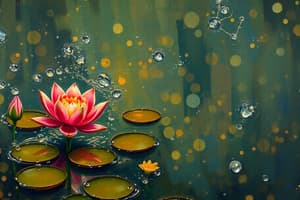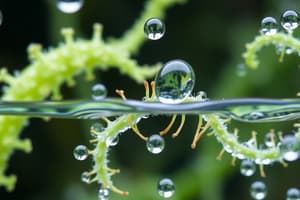Podcast
Questions and Answers
What is the primary characteristic of water that contributes to its ability to form hydrogen bonds?
What is the primary characteristic of water that contributes to its ability to form hydrogen bonds?
- It has a high boiling point.
- It exhibits polarity. (correct)
- It contains carbon atoms.
- It is a non-polar molecule.
How many hydrogen bonds can a single molecule of water typically form?
How many hydrogen bonds can a single molecule of water typically form?
- 4 (correct)
- 8
- 6
- 2
In the context of water as a solvent, which of the following statements is true?
In the context of water as a solvent, which of the following statements is true?
- Water acts as a solvent exclusively for organic molecules.
- Water facilitates the dissolution of salts through hydrogen bonding. (correct)
- Water can dissolve only non-polar substances.
- Water is ineffective in dissolving ionic compounds.
What does the space-filling model of water best represent?
What does the space-filling model of water best represent?
What is the role of hydrogen bonding in biomolecules, particularly in water?
What is the role of hydrogen bonding in biomolecules, particularly in water?
What describes amphipathic molecules?
What describes amphipathic molecules?
What occurs during the dissolution of NaCl in water?
What occurs during the dissolution of NaCl in water?
Which property of water allows it to act both as an acid and a base?
Which property of water allows it to act both as an acid and a base?
What happens during micelle formation in water?
What happens during micelle formation in water?
What is a primary application of micelles in drug delivery?
What is a primary application of micelles in drug delivery?
What is the primary reason water molecules become less dense in ice compared to liquid water?
What is the primary reason water molecules become less dense in ice compared to liquid water?
Which type of hydrogen bonding occurs between different strands in proteins?
Which type of hydrogen bonding occurs between different strands in proteins?
What is the bond angle of water, contributing to its bent molecular shape?
What is the bond angle of water, contributing to its bent molecular shape?
What type of bond exists between the oxygen and hydrogen atoms in a water molecule?
What type of bond exists between the oxygen and hydrogen atoms in a water molecule?
What does the term 'like dissolves like' refer to in the context of water as a solvent?
What does the term 'like dissolves like' refer to in the context of water as a solvent?
Which hydrogen bonding structure is associated with a single strand of protein?
Which hydrogen bonding structure is associated with a single strand of protein?
What type of interactions occur between water molecules and ions during the dissolution of salts?
What type of interactions occur between water molecules and ions during the dissolution of salts?
In which state of water are hydrogen bonds stable and less dynamic?
In which state of water are hydrogen bonds stable and less dynamic?
What can the polarity of water molecules lead to regarding their interaction with other molecules?
What can the polarity of water molecules lead to regarding their interaction with other molecules?
What common trait is shared by both interstrand and intrastrand hydrogen bonding in biomolecules?
What common trait is shared by both interstrand and intrastrand hydrogen bonding in biomolecules?
Flashcards are hidden until you start studying
Study Notes
Water Introduction
- Water is characterized by its polarity due to the polar covalent bond between oxygen and hydrogen, resulting in a bent molecular shape.
- The bond angle in water is 104.5 degrees, influencing its properties as a solvent.
Hydrogen Bonding
- Water can form up to four hydrogen bonds; two can be donors and two can be acceptors.
- Hydrogen bonds are crucial in biomolecules, influencing the structure and stability of proteins and nucleic acids.
- In liquid water, hydrogen bonds constantly break and reform, whereas in ice, they stabilize into a crystal lattice, making ice less dense than liquid water.
Water as a Solvent
- Water's polarity allows it to dissolve ionic compounds effectively; “like dissolves like” principle applies.
- Ion-dipole interactions occur between water molecules and dissolved ions (cations and anions).
- Dipole-dipole interactions in water facilitate the dissolution of polar organic molecules like alcohols and ketones.
Salt Dissolution
- Sodium chloride (NaCl) dissociates in water: Na+ is attracted to the negative side of water and Cl- to the positive side.
- Dissolved ions become solvated as water molecules surround them, breaking apart the ionic crystal.
Amphipathic Molecules
- Amphipathic molecules possess both polar (hydrophilic) and nonpolar (hydrophobic) regions.
- These molecules can form micelles in water, where hydrophobic tails are sequestered inside, minimizing contact with water, while hydrophilic heads face outward, interacting with the aqueous environment.
- Micelles have applications in drug delivery, encapsulating nonpolar drugs within their hydrophobic regions.
Water as Amphoteric
- Water acts as both an acid (proton donor) and a base (proton acceptor).
- As an acid, it can release a proton to form hydroxide ions (OH-).
- As a base, it can accept a proton, generating hydronium ions (H3O+).
Studying That Suits You
Use AI to generate personalized quizzes and flashcards to suit your learning preferences.




